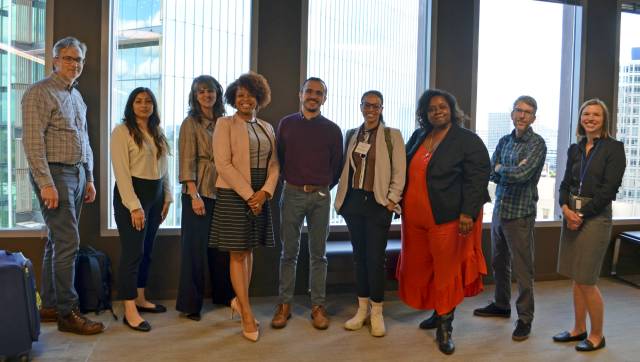You are here
Building Shared Understanding about Public Health Data
In public health, access to accurate, high-quality data can help improve and save lives. Communities, public health officials, policymakers and many others use public health data to guide decisions about clean water access, the placement of preventive services, community development efforts and in countless other ways that support stronger, healthier communities.
Despite data’s impact on everyday lives, public health data is collected using tools, processes and methods that are not always transparent or understandable to broad audiences. Communities often lack insight into how survey data is used to address their priorities and concerns and may have questions about how survey questions are prioritized and who is interpreting the results. At the same time, public health professionals may not understand how their decisions about data collection, analysis and reporting resonate with communities or align with communities’ goals.
To help communities better understand and contribute to national conversations about collecting and using public health data, the CDC Foundation and the National Alliance against Disparities in Patient Health (NADPH) worked with five local Data Equity Coalitions (DECs). The DECs are trusted local organizations with a deep understanding of the best ways to interact and connect with their constituents and advance local priorities. These included:
- Black Equity Coalition in Pittsburgh, PA
- Community Information Now in San Antonio, TX
- Data Driven Detroit in Detroit, MI
- DataWorks NC in Durham, NC
- Neighborhood Nexus in Atlanta, GA
Each organization was tasked with learning more about the data needs and priorities of community organizations, residents and local public health professionals regarding social determinants of health–the circumstances in which people are born, grow, live, work and age–and how public health survey systems could more accurately reflect lived experiences and meet community needs.
To answer these questions, the DECs led local activities like workshops and surveys while also recruiting participants for interviews and focus groups led by NADPH. To support participants with real-world examples, all activities centered on two national surveys and the Population Level Analysis and Community Estimates (PLACES) data platform, which provides health data for small areas across the country (Read our recent blog about PLACES). Overall, the project reached over 1,250 unique participants.
Importantly, NADPH designed the interactive interviews and focus groups with two goals in mind. First, to help national public health data professionals understand community priorities and perspectives surrounding data. And second, to offer community members a safe space to learn and ask questions about the surveys and the data platforms to which they contribute.
“We are very appreciative of the level of respect with which [NADPH] treated members of our community,” said a DEC project partner. “Our participants felt they were heard and mentioned that they enjoyed the conversation.”
By encouraging a reciprocal exchange of ideas and information throughout project activities and engaging with the DECs to design their own approaches, the project yielded a breadth and depth of information about how public health surveys could collect data that supports community needs and accurately reflects diverse experiences. This approach also created opportunities for participants to learn about new tools and information that could support their own work.
To learn more about this project, explore findings from NADPH and the DECs and see the group’s final collaborative report, visit our project webpage.
This program is made possible through funding from the Robert Wood Johnson Foundation. The views expressed here do not necessarily reflect the views of the Robert Wood Johnson Foundation.
The contents are those of the author(s) and do not necessarily represent the official views of, nor an endorsement by CDC/HHS or the U.S. Government.


